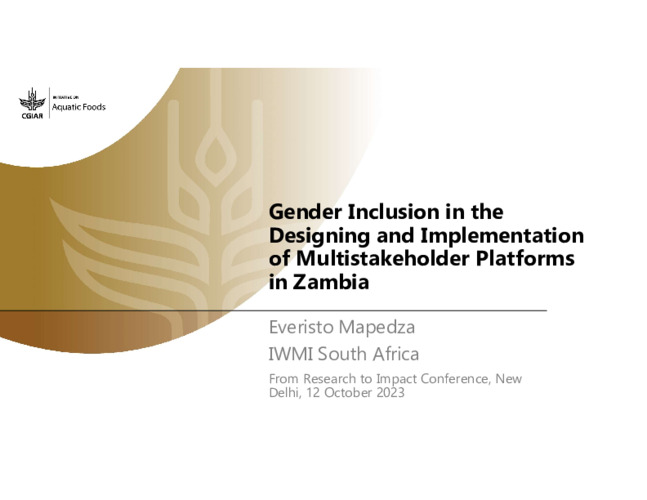Please use this identifier to cite or link to this item:
https://hdl.handle.net/20.500.12348/5837
Gender inclusion in the designing and implementation of multistakeholder platforms in Zambia
| dc.creator | Mapedza, E. | en_US |
| dc.date.accessioned | 2024-03-11T15:06:21Z | |
| dc.date.available | 2024-03-11T15:06:21Z | |
| dc.date.issued | 2023 | en_US |
| dc.identifier.citation | Everisto Mapedza. (12/10/2023). Gender inclusion in the designing and implementation of multistakeholder platforms in Zambia. Bayan Lepas, Malaysia: WorldFish (WF). | en_US |
| dc.identifier.uri | https://hdl.handle.net/20.500.12348/5837 | |
| dc.description.abstract | Meaningfully engaging women in accessing and controlling benefits from agriculture and the broader development agenda has largely remained a source of disillusionment within the development arena. More recently, there has been an increase in the use of Multistakeholder Platforms (MSP) by several actors within CGIAR and beyond. Multistakeholder dialogues aim to ensure that there is a discussion on challenges facing communities within the different landscapes and how solutions are crafted to address the challenges through practical development interventions. This paper, firstly, engages with literature on MSPs and how gender equality and social inclusion can be made intentional by including women and youths in the processes. Secondly, through the practical implementation of the Aquatic Foods Initiative in Zambia, the actual assessments and practical implementation are being monitored and critiqued through the process documentation of MSP implementation to ensure that women and youths are included. The documentation goes beyond inclusion to document the outcomes of women and youth inclusion. Thirdly, this paper situates MSPs within the CGIAR’s MSPs’ broader community of practice to draw further common threads across different contexts, different resources and across different scales. The early findings demonstrate that it is possible to engage women and youths in the designing, implementation, monitoring and evaluation of the MSPs. Such engagement needs to be intentional and must invest time and resources in ensuring that participation goes beyond attendance to informing and influencing the priorities and even going further to ensure those priorities are implemented and reflected upon. | en_US |
| dc.format | en_US | |
| dc.language | en | en_US |
| dc.publisher | WorldFish (WF) | en_US |
| dc.rights | CC-BY-NC-4.0 | en_US |
| dc.title | Gender inclusion in the designing and implementation of multistakeholder platforms in Zambia | en_US |
| dc.type | Presentation | en_US |
| cg.coverage.country | Zambia | en_US |
| cg.coverage.region | Eastern Africa | en_US |
| cg.subject.agrovoc | women | en_US |
| cg.subject.agrovoc | gender equality | en_US |
| cg.subject.agrovoc | multi-stakeholder processes | en_US |
| cg.subject.agrovoc | social inclusion | en_US |
| cg.contributor.affiliation | International Water Management Institute | en_US |
| cg.identifier.status | Open access | en_US |
| cg.description.theme | Gender | en_US |
| cg.subject.sdg | SDG 5 - Gender equality | en_US |
| cg.subject.actionArea | Resilient Agrifood Systems | en_US |
| cg.subject.impactArea | Gender equality, youth and social inclusion | en_US |
| cg.contributor.initiative | Aquatic Foods | en_US |
Files in this item
This item appears in the following Collection(s)
-
Gender [323]
